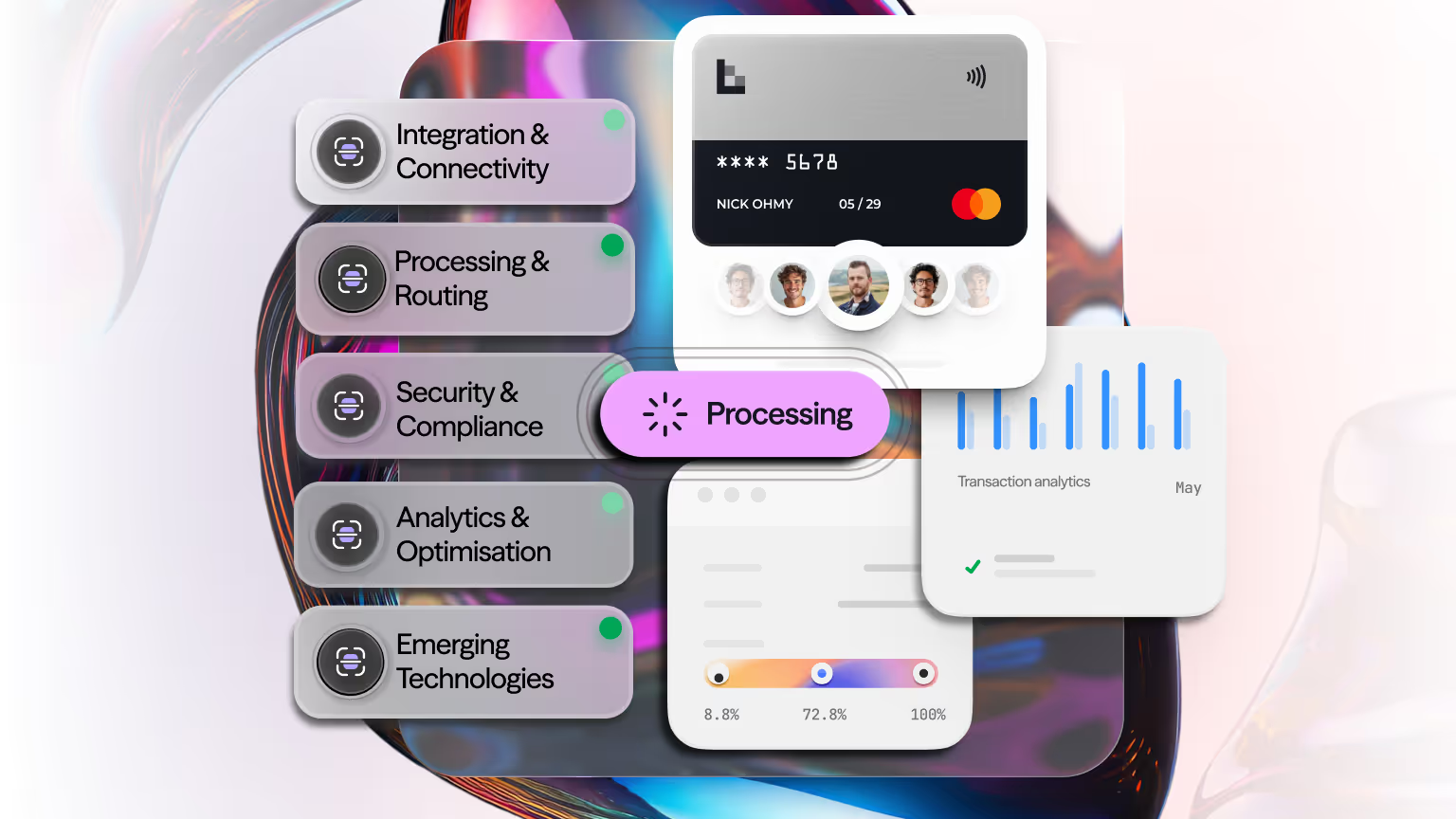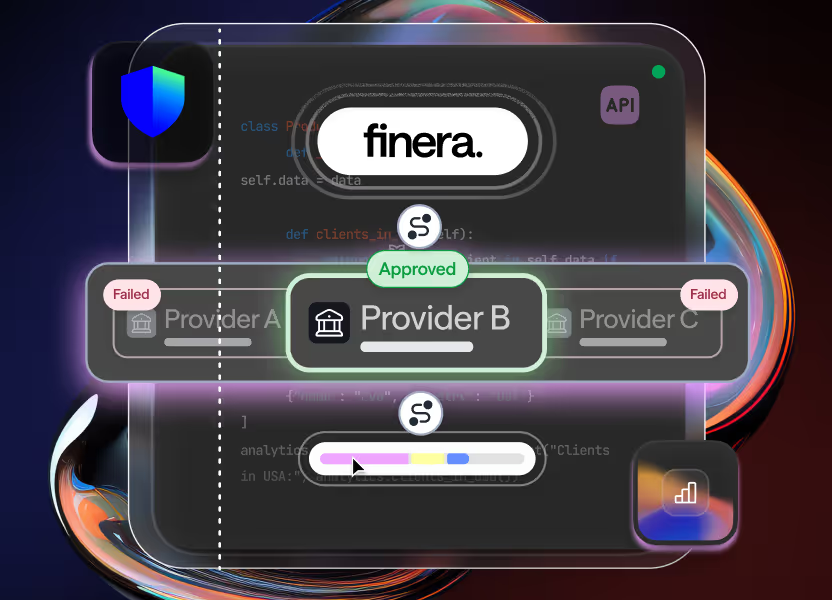Everything You Need to Know About Smart Routing
Boost approvals, cut fees, and keep payments flowing with smart routing for every transaction.

When you tap your card or complete an online purchase, it feels instant. But in reality, that approval is the end result of a journey through banks, processors, and card networks.
Smart routing payments act like an air traffic controller for your transactions, ensuring every payment takes the fastest, safest, and most cost-efficient route to success. This technology is a strategic advantage that can increase approval rates, reduce processing costs, and make payment systems more resilient.
For merchants, the impact is tangible: more approved transactions, fewer unnecessary declines, lower processing costs, and greater operational resilience. Whether you’re serving customers locally or selling across multiple continents, smart routing creates a checkout experience that’s faster, more reliable, and built to adapt in real time. It’s a competitive advantage that keeps payments flowing smoothly, even when the market, networks, or processors hit turbulence.
What Is Smart Payment Routing?
Smart payment routing, sometimes called intelligent transaction routing, automatically directs a payment to the processor most likely to approve it.
Instead of sending all payments through a single provider, businesses connect to multiple acquiring banks and gateways. The routing system then evaluates each transaction in real time and chooses the best processor based on rules and live performance data.
A helpful way to picture it is to imagine a toll booth with multiple open lanes. Drivers are guided to the lane that will clear them the fastest, avoiding slowdowns or blockages. Smart routing does the same for payments.
How Smart Routing Works in Payments
The process takes place in milliseconds, but it’s surprisingly methodical. Once a customer clicks “Pay Now,” the system captures details such as the card type, issuing bank, location, currency, and amount. The routing engine analyses these factors alongside processor uptime, approval history, and fees.
From there, the payment is sent to the processor most likely to approve it at the lowest cost. If that processor declines the payment, failover routing kicks in and instantly tries again with another provider. All of this happens behind the scenes, so customers simply see a smooth, reliable checkout.
How Smart Routing Payments Adapt to Different Industries
While the core principle of smart routing payments is universal, its impact can look very different depending on the industry.
In e-commerce, it ensures high approval rates during peak shopping events by redirecting payments if a processor becomes overloaded.
In the travel industry, where bookings often involve multiple currencies and cross-border transactions, it reduces costly foreign exchange fees and increases acceptance rates for international cards.
For subscription-based businesses, smart routing keeps recurring billing running smoothly, minimising churn caused by failed renewals.
Even in high-risk sectors like online gaming, where approval rates tend to be lower, intelligent routing identifies the processors most likely to approve transactions without driving up costs. In every vertical, the technology tailors its approach to sector-specific challenges, keeping payments efficient, reliable, and cost-effective.
Why Businesses Choose Smart Routing Payments
One of the biggest benefits is higher approval rates. Transactions are sent to processors with the strongest track record for that particular card type, issuing bank, or region. This means fewer false declines, which directly improves revenue and customer satisfaction.
Cost savings are another major draw. By routing transactions strategically, businesses can reduce fees, avoid unnecessary cross-border charges, and keep more of each sale.
Smart routing also increases resilience. If a processor experiences downtime or slow performance, transactions are automatically routed elsewhere. This reduces the risk of lost sales during peak shopping periods or technical outages.
For businesses expanding internationally, intelligent routing can support local acquiring in multiple markets. This not only lowers costs but also presents customers with familiar payment methods, which can improve trust and conversion rates.
Most importantly, it creates a better customer experience. Smooth, fast checkouts and fewer payment failures mean fewer abandoned carts and more returning customers.
When Smart Routing Becomes Essential
Not every merchant needs smart routing on day one, but it quickly becomes indispensable in certain situations. Businesses operating in multiple currencies or countries benefit from its ability to optimise cross-border payments. Those experiencing high decline rates gain from its approval-boosting capabilities.
If your business relies on a single payment processor, smart routing acts as an insurance policy, protecting sales in case of downtime. It’s also a valuable tool for managing seasonal spikes in traffic, ensuring your checkout remains stable under heavy demand.
Smart Routing Payments vs Traditional Payment Processing
Traditional payment processing sends every transaction through a single, fixed processor. This approach can work in a simple setup but leaves you vulnerable to performance fluctuations, regional approval differences, and technical issues.
Smart routing, on the other hand, connects you to multiple processors and makes routing decisions dynamically. This means the system can respond to real-time conditions, choosing the fastest and most reliable path for each payment. It also allows you to set rules that balance cost, risk, and performance in a way that suits your business.
The end result is a payment system that adapts to challenges rather than being slowed down by them.
Advanced Strategies for Payment Routing
Once the foundations are in place, businesses can fine-tune their routing rules for even better performance. For example, payments can be directed based on the time of day if certain processors perform better during particular hours. Transactions can be routed according to risk, sending low-risk payments to lower-cost processors and high-risk payments to those with stronger fraud detection.
Card BIN routing is another strategy, using the first six digits of a card to determine the issuing bank and send the payment to the processor with the best approval record for that bank. And with instant retry logic, failed payments can be automatically retried with a secondary processor, often recovering a sale that would otherwise be lost.
Implementing Smart Routing Payments
There are two main ways to bring smart routing into your payment system. The simplest is to use a payment orchestration platform. These connect you to multiple processors through a single integration and come with built-in routing logic, analytics, and compliance tools.
The other option is to build a custom routing system in-house. This gives you complete control but requires significant development resources and ongoing maintenance.
Key Takeaways
Smart routing payments give businesses control, reliability, and efficiency in a part of commerce that’s often overlooked, the journey a payment takes after the customer hits “Pay Now.”
By dynamically choosing the best route for each transaction, you can:
- Increase approval rates
- Reduce processing costs
- Protect revenue from downtime
- Improve customer satisfaction
Intelligent payment routing keeps your transactions flowing smoothly, your costs under control, and your customers coming back.
Why Smart Routing Payments Are the Future of Transaction Success
Speed, reliability, and efficiency directly impact the bottom line of businesses. Smart routing payments have evolved from a technical upgrade to a business necessity.
They give merchants the flexibility to adapt to real-time network conditions, the intelligence to maximise approval rates, and the control to keep costs in check. They also safeguard revenue during processor outages and maintain a smooth customer experience regardless of where a shopper is located.
As markets become more competitive and customer expectations rise, the businesses that thrive will be those that treat payment routing as a core part of their growth strategy. Implementing intelligent payment routing today is an investment in more approvals, lower fees, and stronger customer loyalty tomorrow.
At finera., we help merchants maximise the potential of their payment systems with advanced smart routing solutions tailored to your industry, geography, and customer base. If you’re ready to increase approvals, cut costs, and future-proof your checkout, get in touch with finera. today and see how our platform can route your payments to success.
This article on payment methods is for informational and educational purposes only.
- Not Professional Advice: The content provided does not constitute financial, legal, tax, or professional advice. Always consult with a qualified professional before making financial decisions.
- No Liability: The authors, contributors, and the publisher assume no liability for any loss, damage, or consequence whatsoever, whether direct or indirect, resulting from your reliance on or use of the information contained herein.
- Third-Party Risk: The discussion of specific payment services, platforms, or institutions is for illustration only. We do not endorse or guarantee the performance, security, or policies of any third-party service mentioned. Use all third-party services at your own risk.
- No Warranty: We make no warranty regarding the accuracy, completeness, or suitability of the information, which may become outdated over time.
Frequently Asked Questions

Still Have Questions?
Let’s Find the Right Solution for You
Stay Connected with Us!
Follow us on social media to stay up to date with the latest news, updates, and exclusive insights!








